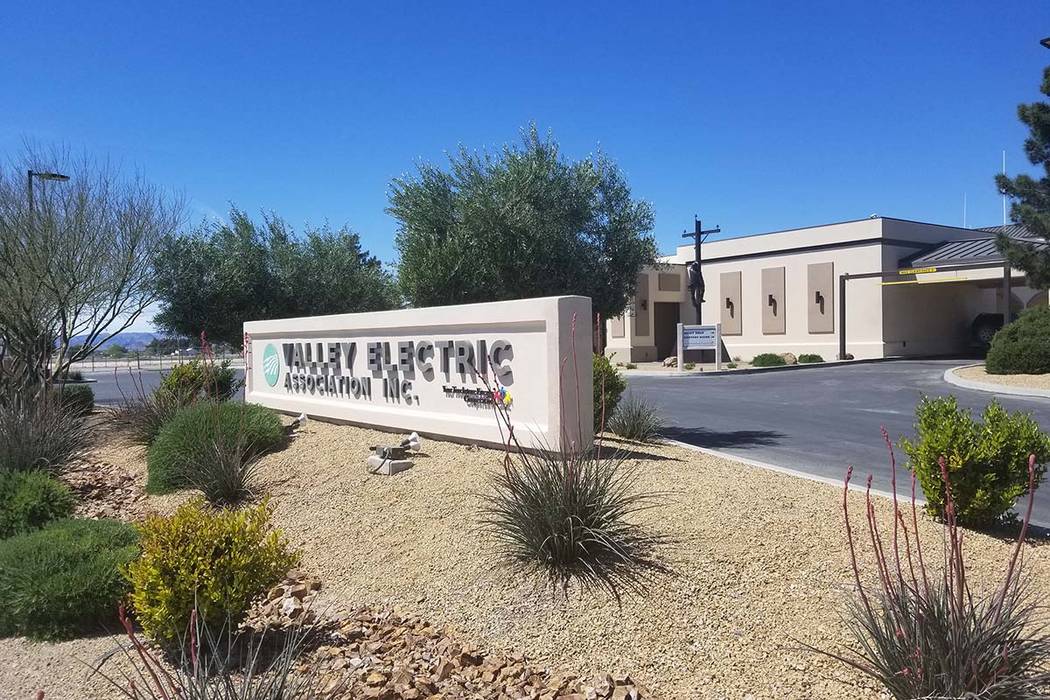Valley Electric scandal raises question about oversight
Pahrump utility Valley Electric Association has faced a series of allegations from law enforcement against former and current executives since February.
On Feb. 22, the Nye County Sheriff’s Office conducted a search warrant based on allegations of sexual harassment and financial cover-ups. Later that month, former CEO Angela Evans was arrested on suspicion of embezzlement. The district attorney’s office has not filed charges, but the utility cut ties with her this week.
According to some energy experts, cooperatives’ lack of regulatory oversight makes them more susceptible to scandals. Others say allegations like these are rare and could take place within any type of utility.
Hank James, executive director of the Nevada Rural Electric Association, a nonprofit group that represents several power buyers, said the level of allegations toward a cooperative utility like VEA have “no precedent, certainly not in Nevada.”
Cooperatives are run by a member-elected board, unlike regulated electric utilities such as NV Energy and Southwest Gas Co. Regulated utilities like NV Energy must go to the Public Utilities Commission of Nevada if they want to change rates or add any sort of energy option, while cooperatives’ board members have the authority to make such decisions.
Rob Wilhite, managing director of energy for consultancy firm Navigant, said both types of utilities are usually impervious to scandals.
“That doesn’t happen very often, period, in this industry,” he said.
Kevin O’Donnell, a financial analyst with North Carolina-based Nova Energy Consultants, believes cooperatives are more susceptible to scandals.
“It’s almost impossible with a municipal utility because everything is public,” he said. “It’s not like all cooperatives are bad. There are a tremendous amount of good ones. The fact that they’re not regulated tends to present problems.”
O’Donnell said cooperatives often lack the level of transparency found in other utilities because they’re self-regulated.
Wilhite disagreed, saying board members usually try to be transparent with members because they’re from the same community.
“I think the cooperative governance process tends to have a fair amount of transparency to it,” he said. “It’s not universally across the board, but some do a better job providing than others.”
While Valley Electric isn’t overseen by a regulatory commission, it did release a 2018 audit to the public that showed its 2018 financial statements “present fairly” its financial position.
Jon Wellinghoff, CEO and founder of consulting company Grid Policy, said that though the method of oversight is different, cooperatives aren’t more prone to scandals than other utilities.
“That happens in any corporation, whether its regulated or unregulated,” he said.
The solution to bad actors in a cooperative is more regulation, O’Donnell said.
“If you want to prevent any issues like this going forward, the best way is to have them rate-regulated,” he said. “Then, the rates are public. The details of all their financial transactions are public access to state regulators. There’s less of a likelihood anything can slip by.”
Former PUC Chairwoman Alaina Burtenshaw said she believes investor-owned electric utilities like NV Energy are subject to a significantly higher level of regulation. Every rate change must first be approved by the PUC, and the utility is subject to investigations and rule-making.
But Wilhite said regulation isn’t a guaranteed cure-all.
“There’s no guarantee that incidents like this will not occur,” he said.
Contact Bailey Schulz at bschulz@reviewjournal.com or 702-383-0233. Follow @bailey_schulz on Twitter.
Utility scandals
While experts say scandals in utilities are rare, there are examples of cases across the country.
Five officials of the Connecticut Municipal Electric Energy Cooperative were indicted after a two-year investigation by the FBI. The utility's CEO and other officials were charged with theft of federal funds, and were accused of using money from the cooperative for trips to places like the Kentucky Derby, according to the U.S. Department of Justice.
California-based PG&E Corp., which owns the state's largest electric utility, announced bankruptcy in January after its infrastructure was linked to last year's Camp Fire wildfire. And Houston-based Enron is infamous for its accounting a scandal that led to its 2001 bankruptcy.























